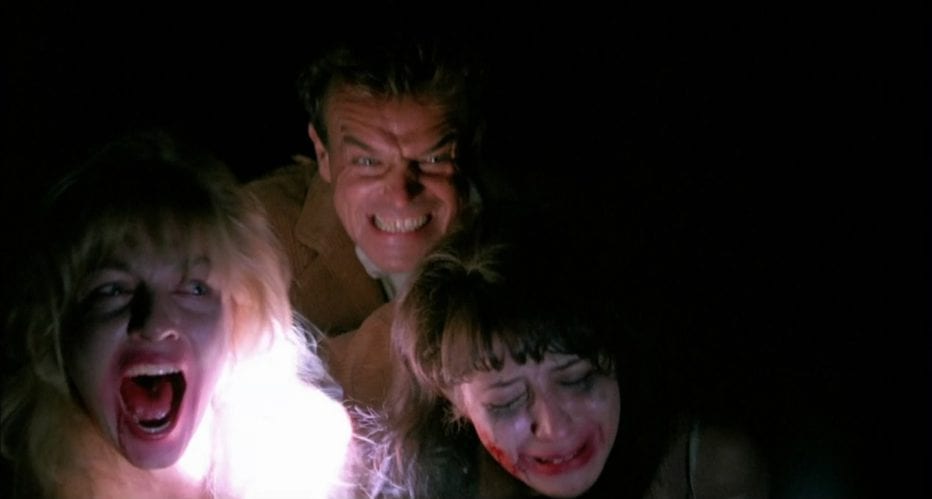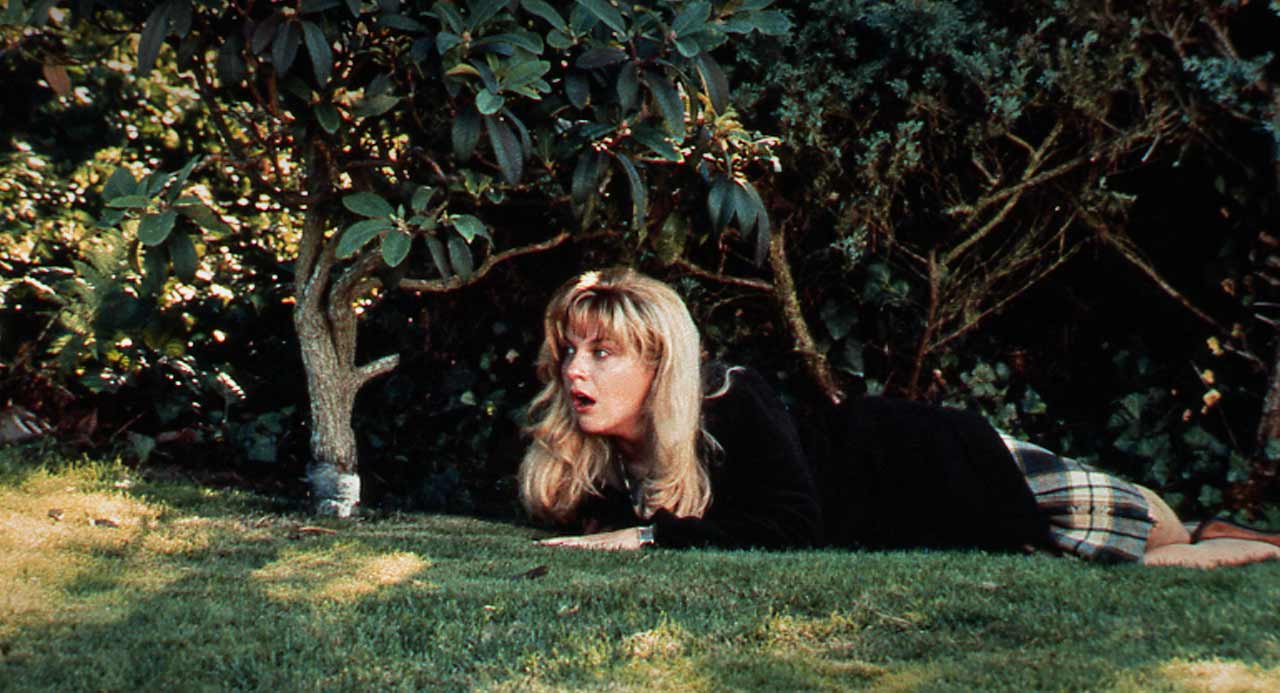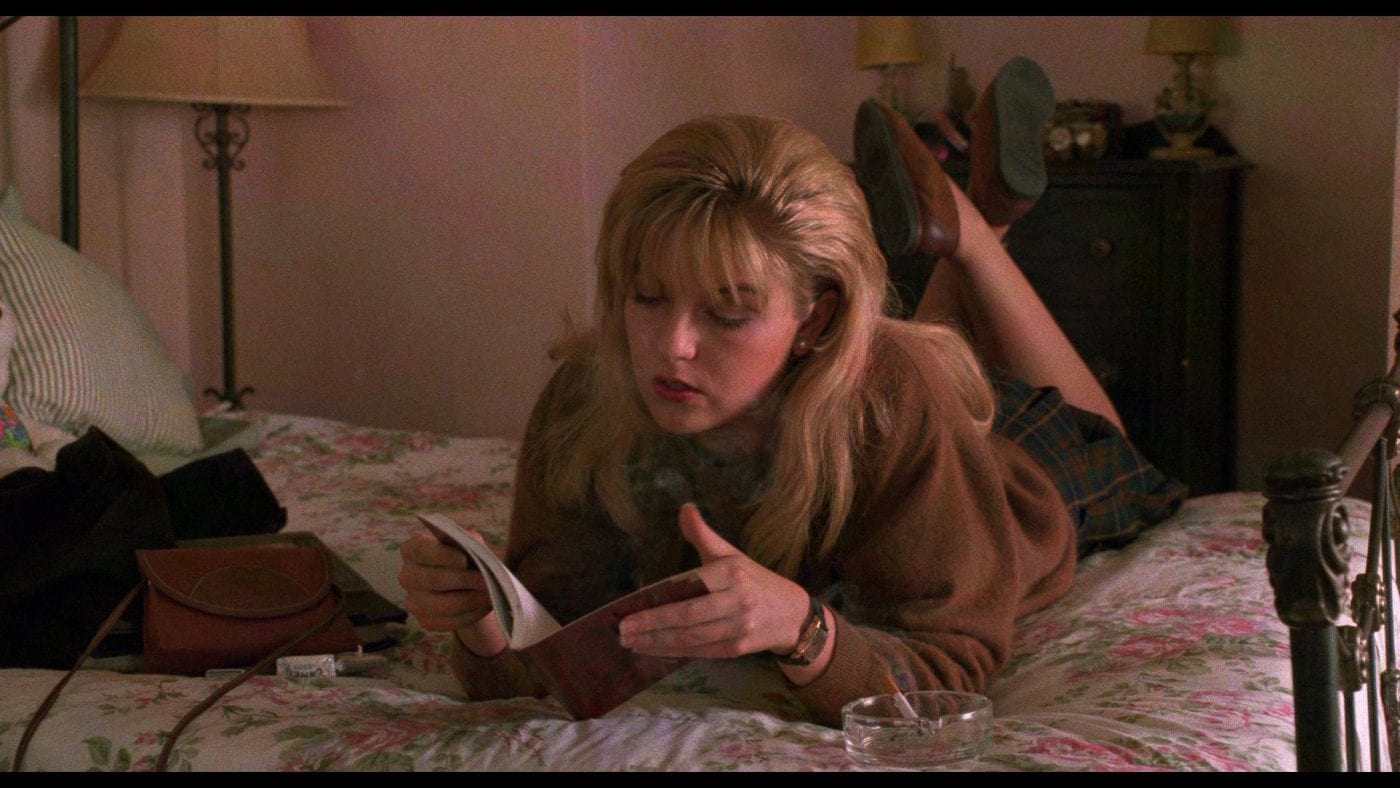Twin Peaks: Fire Walk With Me was where most of us thought the Twin Peaks story would end. The 1992 film served as both a prequel and a sequel and introduced us to many of the mythological staples that fans would spend twenty-five years basing their theories around, prior to the arrival of Season 3. The film was a unique blend of surrealism, horror and heartbreaking tragedy that results in a something truly magical. While many conversations have shifted after Season 3 changed the landscape, we are now at a unique time as Twin Peaks fans and scholars where revisiting Fire Walk With Me and seeing not only how it bridges the gaps between the original seasons and Season 3 but also what the film can tell us in our understanding of both is essential. In this article I want to look back at not only what makes this film such a powerful piece of art but also how it connects to the larger Twin Peaks narrative.
Twin Peaks: Fire Walk With Me stripped away the charm of the series before it and dove head first into what Twin Peaks is all about: a young woman who is molested by her own father from the age of 12 until he ultimately kills her. Laura’s pain and the ripple effect it causes takes center stage as David Lynch and co-writer Bob Engels remove the ambiguity concerning how guilty Leland Palmer actually was and point the finger squarely at him. BOB or no BOB, Fire Walk With Me does not let Leland off the hook the way some felt the original series did.
In a film full of scenes that have the ability to rip your heart out of your chest, perhaps the most difficult part for me personally is when Laura yells “Daddy!” as Leland runs both his bound daughter and Ronette Pulaksi towards the train car, where he will ultimately kill Laura. The innocence and terror in Laura’s voice, both child-like and petrified, brings things into perspective.
We spend much of the film watching Laura use her various defense mechanisms to get through each day. We view her as broken but strong, yet no matter how strong we view Laura, she is a teenager about to be murdered by her Dad. Laura yelling “Daddy!” reinforces both her age and how truly horrific what we are viewing really is. Children depend on their parents to care for them, regardless of how old they are. Laura spends her final moments knowing that her own father is about to take her life. It goes against the natural order; an act so disturbing it’s hard to put into words.

Twin Peaks: Fire Walk With Me, long before Season 3, The Secret History of Twin Peaks or The Final Dossier divided the Twin Peaks fandom. You had one camp that embraced the devastating viewing of Laura Palmer’s final seven days and mythological advancements and championed the film. A second camp longed for the familiar faces and charm of the series and looking at the heart of what Twin Peaks was about was simply too much for them. Cherry pie was replaced by incest and that wasn’t easy to swallow. In the Twin Peaks fandom today, Season 3 has still left so much to process and unpack that we’ll be talking about those eighteen hours for years to come but it’s crucial for us in our studying of the narrative to acknowledge exactly how much of Season 3 was born in Fire Walk With Me.
Look no further than the much beloved David Bowie scene in the film or the Annie Blackburn prequel/sequel scene in Laura’s bed. Fire Walk With Me not only gave us this notion that time is not how we perceive it but it also gave us the ring, Judy, the importance of electricity, and characters like Phillip and Carl Rodd who would be integral parts of Season 3. It’s also worth noting that Fire Walk With Me would not only literally sit in between the original series and Season 3 but also, content-wise, was truly the bridge between the heavy-on-emotion yet filled-with-humor original series and then the lighter-on-emotion but heavy-on-mythology Season 3. Fire Walk With Me may have seemed shocking when it first came out, feeling not much at all like what we had seen on television before but imagine how much more of a shock Season 3 would’ve been had we not had the film in between, introducing us to many of the concepts we would be analyzing endlessly in 2017, when Showtime revived the show? Despite how much the Twin Peaks narrative changed over time, there was always one constant and her name is Laura Palmer.
Laura Palmer was the heart of Seasons 1 & 2, despite already being dead. Her death was felt by all, impacting everyone in different ways. For some, it was guilt over not seeing what was happening right before their eyes. For others, it was more personal. In Fire Walk With Me, Laura is front and center, nothing left to interpretation or for the imagination. Much of the film is about Laura getting to a place of acceptance over who BOB is—her father. Early in the film, BOB appears in Laura’s room in the middle of the day, prompting Laura to run out of the house. Minutes later, she sees her father exit, more or less confirming her tormentor’s true identity. Still, due to the nature of what she’s being forced to accept, Laura can not fully admit to herself that her own father is the one that has been abusing her since she was a pre-teen. Still, the survivor in Laura pushes her to pursue confirmation of BOB’s true identity, leading to a horrific reveal mid-rape, as Laura asks BOB who he really is and her father’s face becomes visible to her. In many ways, this is the climax of the film—Laura, the victim, choosing to exit denial and accept the brutal reality of who her abuser is. This is when we see Laura’s strength really emerge as she no longer will be a victim.

Despite its complexities, Twin Peaks was always a story of good vs evil that elaborated on shades of grey at the same time. The theme of duality has been well studied and documented. From the name of the show itself, the Black and White Lodges, doppelgangers, good friends and boyfriends (Donna and James) to bad friends and boyfriends (Ronette and Bobby)—the list goes on and on. A very high level view of Season 3 is that it’s a study of a world without Laura Palmer. Sure, she’s remembered and referenced by some but her memory has faded, her strength and inner goodness taken away from the town in her memory’s absence.
A world without Laura Palmer, in the mind of David Lynch, is a world without goodness. Part 8 showed us how Lynch felt about Laura—the golden Laura orb was a metaphor for love, light, strength and the positive things in this world, sent to balance the bad. A world without Laura’s traits is the dark, cold world depicted in Season 3. If we want to take a meta look at this, Season 3 could be a dramatized version of how Lynch felt about Season 2. He’s on record saying it wasn’t Twin Peaks. In the darkest hours of the show’s second season, Laura’s spirit and essence were nowhere to be found. Did Lynch exorcise his personal demons and hard feelings about how the original series played out by making it a part of the Season 3 narrative? He’ll never confirm that but it’s an interesting thought nonetheless. Albert once questioned if BOB was just “the evil that men do”. If Fire Walk With Me was about Laura the survivor not giving into evil and goodness prevailing, was Season 3 the opposite, a world where evil was prevailing over goodness?
The character of Laura Palmer began the Twin Peaks narrative as a body wrapped in plastic that gave this story its start and was also in the final scene of Season 3. This has always been Laura’s story and when Twin Peaks wasn’t about Laura, it didn’t feel right. In other shows or films, the dead girl would be the catalyst for the narrative and other characters would move it forward. Not here; not in Twin Peaks. Laura’s presence was always felt, all the way through the conclusion of the mystery surrounding her murder. Then we got an entire film to see her live, to see her speak, to bear witness to her pain and how much of a survivor she truly was. We got to see her exit the denial over who was hurting her and we got to see her make the choice to give up her own life rather than carry on the cycle of abuse, death over giving into BOB. In Season 3, she was dead yet she lived, which is exactly how it was before. Twin Peaks, when at its best, never lets us forget Laura or what this story is truly about. Laura lives on for many reason and Fire Walk With Me showed us what those reasons are. The coffee and pie jokes of the original series and the tulpas, vortexes, and bending of time in Season 3 are the added bonuses, the aspects that make Twin Peaks even more rich and layered. The story of good vs evil, the battles within a person, the evil that happens under our noses and what life is like for those who suffer such tragic abuse is what Twin Peaks is about. It’s about casting a light on the darkest of evils this world has, long before it became a cultural topic of conversation. Laura was a face for every abused child out there and Twin Peaks: Fire Walk With Me was their story, giving these victims a voice.
Twin Peaks: Fire Walk With Me was the perfect bridge between what the original series was like and what we would get in Season 3. It was a truly horrific film, with genuine scares that stick with you for a lifetime. In typical Lynch fashion, there are parts of the film that make you question what is a dream and what is reality. There are elements without easy conclusions, left to debate and theorize over. The film displays some amazing character moments, where we got added insight into why these characters behaved and felt the way they did in the original series with some remarkable acting from the entire cast.
Most importantly, we got Laura, her story and her redemption in her own eyes. We got a film where those who have experienced great pain can not only relate to but also look to the character of Laura as a beacon of hope for themselves. Twin Peaks: Fire Walk With Me is not the easiest film to sit down and view but it isn’t designed to be. Great art makes you feel a wide range of emotions and that’s exactly what you get here. We got Laura and Laura is the one.




I didn’t know anything about Twin Peaks until I was at a my friend’s house; Jen and I had a healthy streak of disobedience in us and that day, we indulged it by taking the movie her parents had rented and watching it. She had seen a few episodes because her parents liked it but I was totally lost. And disturbed. And frustrated. But I liked Jen and as the movie went on, it became more mysterious than frustrating. Who the hell was the little guy talking backwards? He identified himself as The Arm but …???
It was also the 1st David Lynch movie that I saw. A few years later, I was working at Tower Records, obsessed with groups like Nine Inch Nails, Ministry and Marilyn Manson. One I went on a date with a co-worker named Melissa, who was was a big David Lynch fan and that night was the premiere of “Lost Highway” (NOTE: since FWWM, I had seen “DUNE” and fucking loved it) … a few hours later, we stumbled out of the movie, she was yawning and totally confused about the movie … I declared that I was now officially a fan of David Lynch. When Manson and Twiggy had their cameos, Melissa and I both laughed.
Using my employee discount, I bought everything David Lynch. This included the entire Twin Peaks series on VHS which was annoyingly released with three episodes per tape. As my obsession grew, a friend gave me a box of David Lynch odds and ends from when he was my age … one of those items was the “Diane” audio book and the Laura Palmer diary.
When Showtime did the 3rd season, I was dubious but I waited until it was over then got the channel for one month so I could binge it …. and I am a freak for ALL the works of David Lynch to this day. I also love Denis Villeneuve so I’m excited for Dune but I’m also wary.
I’ve read a few articles claiming there’s a season 4 in the works but I dunno. The 3rd season was kinda perfect.
….. ten minutes into the pilot episode, I was only vaguely irritated that I knew who killed Laura Palmer
This is the best review of Twin Peaks FWWM I have ever read. Thankyou Andrew. I was 27 when seaason 2 ended. Knowing a film was in the process made me ponder all things Peakies did. However when I finally got to see the film I am glad that I read papers and knew David Lynch wasn’t going to spare the pain. It was magnificent. Yes I yearned for more Audrey and the Martels , but I was grateful for a backstory and some real lky awesome new ideas. Thanks